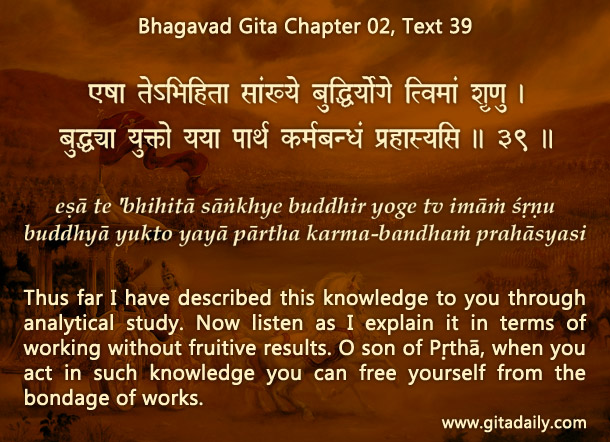In the Bhagavad-gita, Arjuna’s driving question is about dharma, the right thing to do. Yet Krishna’s response contains far more references to yoga than to dharma, beginning right from the second chapter itself (02.39). In fact, every Gita chapter’s traditional name contains the name ‘yoga’ — and the Gita itself is called yoga-shastra (scripture about yoga) much more frequently than it is called dharma-shastra (scripture about dharma). Why does the Gita emphasize yoga more than dharma?
Because the Gita’s message hinges on a key truth: to know the right thing to do (dharma), we need to first know the right way to link with reality, or at least as big a picture of reality as we are capable of assimilating. And such a link with reality is the essence of yoga, which literally means linking or connecting or harmonizing.
Consider a driving metaphor. To know the right way to drive on a road, we need to link properly with the road — that is, we need to know what roads are meant for and, more importantly, what we are meant to do on the road.
Gita wisdom explains that life is like a journey. Or more precisely, we are souls on a multi-life journey of spiritual evolution, that is, of evolving understanding of life’s meaning and purpose. To know the right thing to do, we need the right understanding of existence, especially our place and purpose in it. And the Gita offers various paths of yoga for those who are at various stages in their spiritual evolution. Thus, the Gita’s answer to a circumstantial question — what is the right thing to do? — rests on and redirects us toward the ultimate transcendental question: what is life meant for?
One-sentence summary:
By emphasizing yoga (connection with reality), the Gita links our circumstantial concerns about the right thing to do (dharma) with our life’s transcendental purpose.
Think it over:
- What are the indications that the Gita emphasizes yoga more than bhakti?
- How are yoga and dharma related? Explain with a metaphor.
- How does yoga provide a foundation for deliberation on dharma?
***
02.39: Thus far I have described this knowledge to you through analytical study. Now listen as I explain it in terms of working without fruitive results. O son of Prutha, when you act in such knowledge you can free yourself from the bondage of works.
To know more about this verse, please click on the image


Yoga leads to Dharma